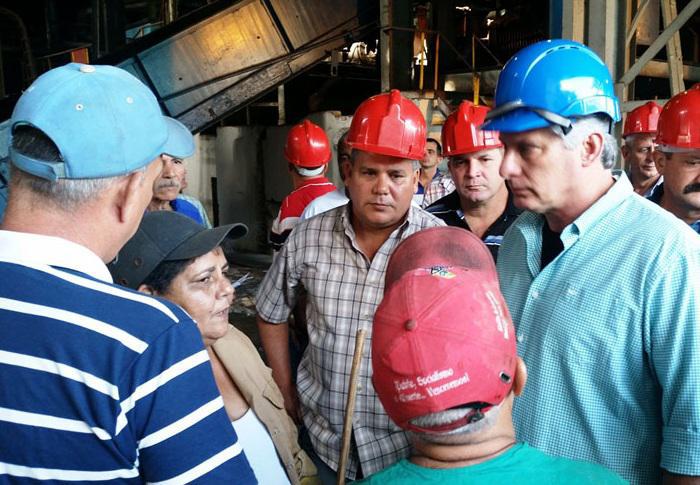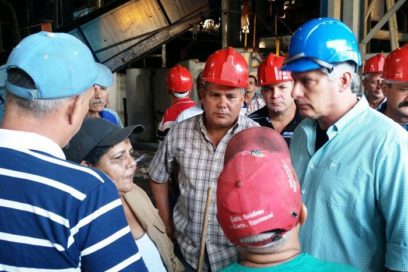By Ángel Freddy Pérez Cabrera

Villa Clara looks set to meet its sugar production plan, however in order to do so, the entire process must run like clockwork in this decisive phase of the harvest; ensuring efficiency and production quality, as well as the commitment of the workforce, stated Miguel Díaz-Canel Bermúdez, first vice president of Cuba’s Councils of State and Ministers, whilst visiting important facilities in the province.
Speaking with Julio Lima Corzo, first secretary of the Party Provincial Committee in Villa Clara, and directors of the Azcuba Enterprise Group at the Ifraín Alfonso sugar mill, Díaz-Canel, also a member of the Party Political Bureau, learned that 216,000 of a planned total of 270,000 tons of sugar have been processed to date. The planned quantity is an achievable figure if the entire process is well planned and executed with efficiency.
During the visit, Díaz-Canel inquired as to the causes of delays in certain mills such as the José María Pérez and Abel Santamaría facilities which, given failures to fulfill investment plans, breakages and other setbacks, were unable to meet their targets, an experience, he noted, from which lessons should be taken looking toward future harvests.
The First Vice President also visited Santa Clara’s Manuel Ascunce Domenech Pedagogical School, where he received information regarding the progress being made by the institution and its role in training teachers for the province.
Whilst speaking with senior staff and students at the school, Díaz-Canel highlighted the work of teachers who have graduated from the institution to date, and stressed the need to continue training young people as the next generation of teachers, while also emphasizing the importance of using multimedia and audiovisual materials provided by the State.
Díaz-Canel also visited one of the three bio-fertilizer and pesticides plants being built in the country – the other two are under construction in Havana and Granma – which will supply the central region with these products, of which a certain portion will also be exported.
Once the plant is fully operational – which it should be in 2018 – it will be able to produce 1,000 tons of Biorat and the same amount of solid bio-pesticides, as well as six million liters of liquid bio-pesticides, which will contribute to increasing crop yields, and improving soil quality by reducing the use of chemical fertilizers, among other advantages. (Taken from en.granma.cu)


